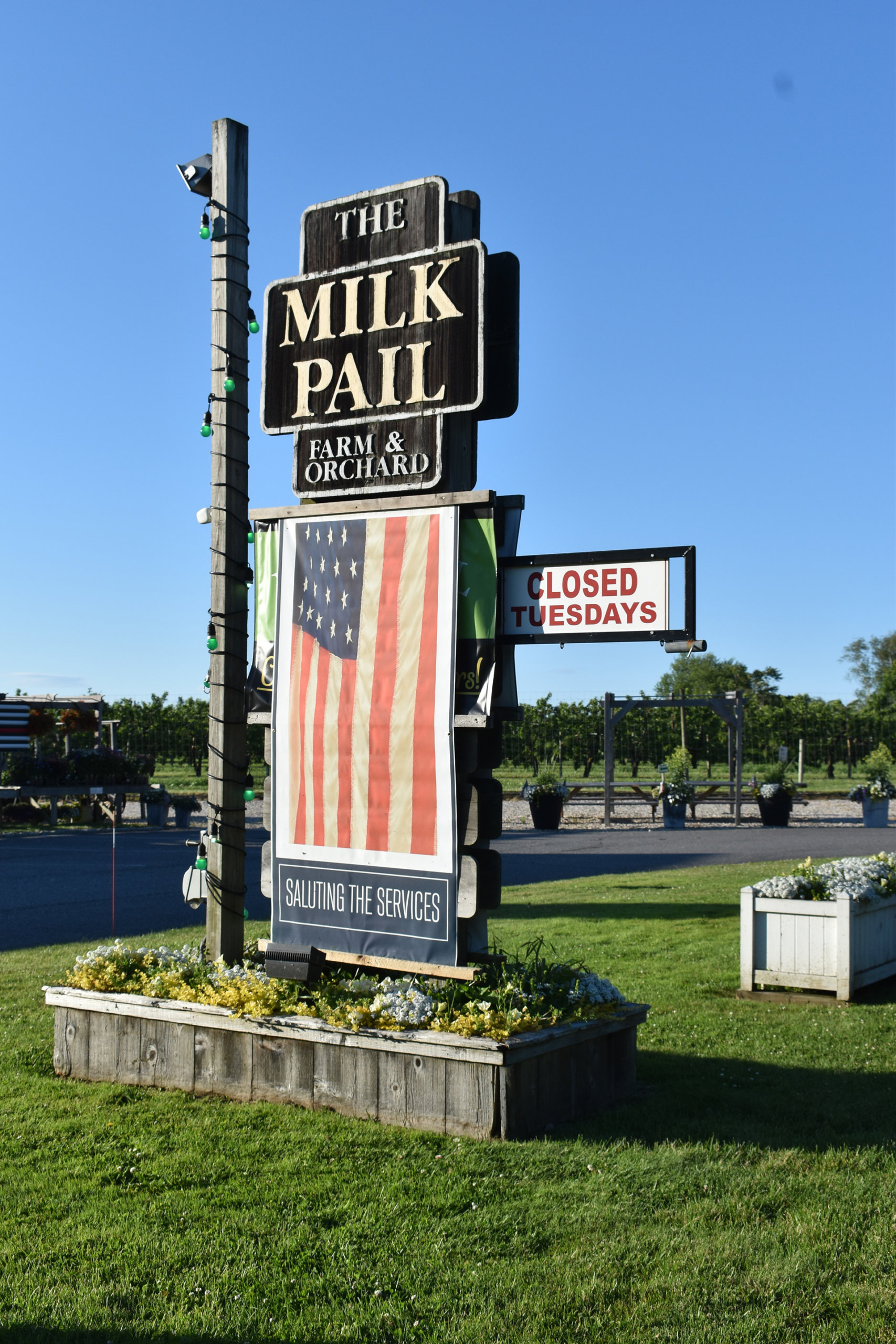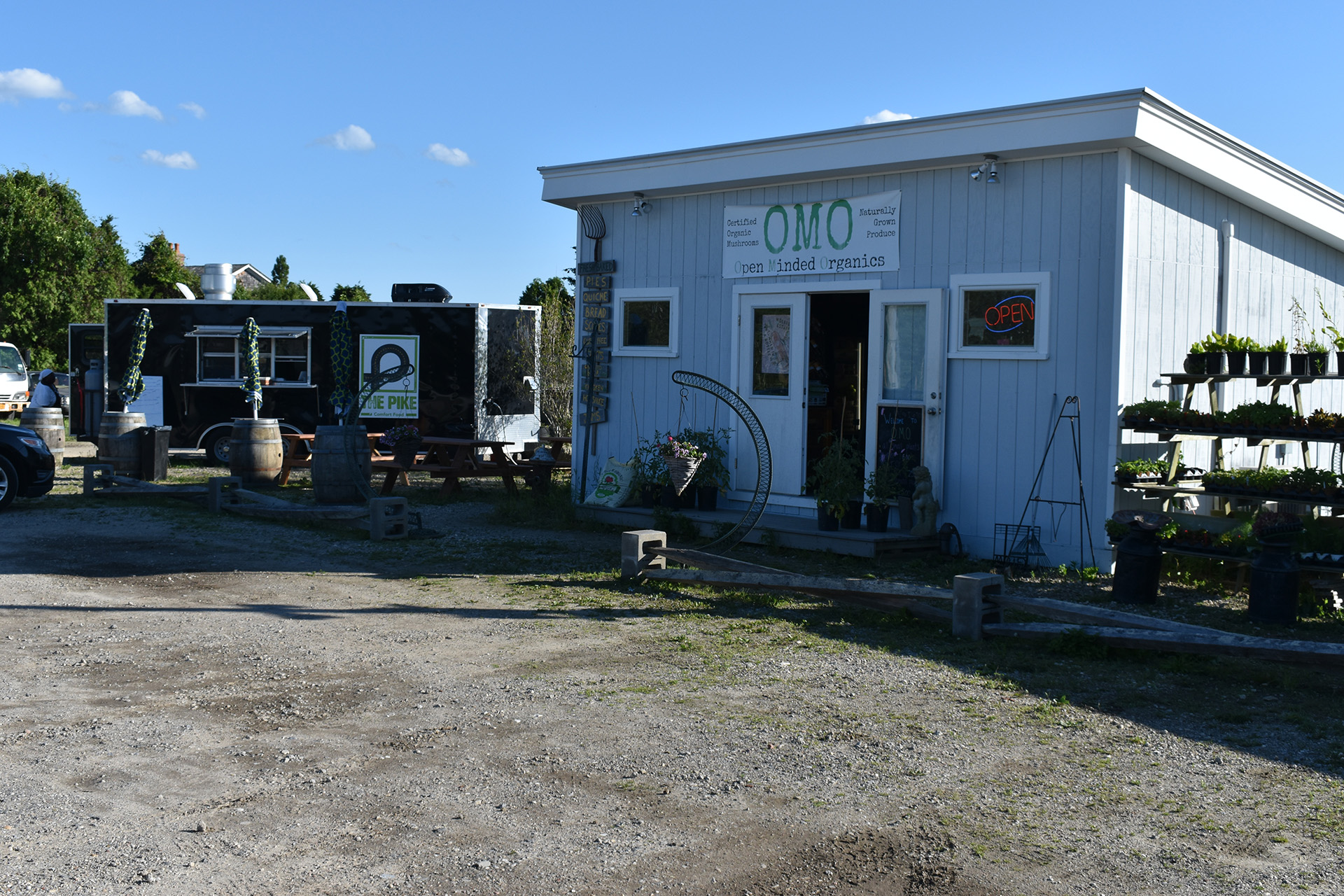Fight Over Food Trucks At Farm Stands


Farm and food truck owners are looking to serve up some local fare on a more permanent basis.
The Milk Pail co-owner Amy Halsey has been searching for a way to help her small, family-run business stay afloat, so she approached Southampton Town Councilwoman Christine Preston Scalera seeking a method of approval for having a food truck at her market from open to close.
“Agriculture is about growing, and not only food sometimes,” said Halsey, noting that her grandfather grew potatoes for soldiers during the war, and her father operated a dairy business before she and her sister went the retail route.
“Food trucks support agriculture, which is the building block of this town; showcase our food; and are in demand from our clients. This is simply another way of adapting to society’s ever-changing climate. Food trucks are a great way for the community to come together and network — many have a following, and people often go to areas they are unfamiliar with to find them. In turn, they learn about other businesses while visiting, and it supports local commerce.”
But not everyone at a June 11 public hearing on the issue saw things the same way. For Bridgehampton-based World Pie Restaurant owner Mike Mannino, it creates unfair competition.
“It’s hard enough to try and maintain a year-round business in this resort area, and having to compete with food trucks which are not held to the same standards will make it virtually impossible,” he wrote in a letter to the town board. “Most year-round businesses are barely getting by as it is, and this proposal may be enough to drive them out of business.”
Assistant Town Attorney Katie Garvin suggested changes in the temporary farm stand permit law to allow food trucks on the premises as accessories to farm stands, but only those selling items that are 80 percent comprised of ingredients either grown on the farm or locally. The farm stand locations would also need to have existing parking necessary to have a truck on the premises.
Sabrosa Mexican Grill owner Jay Andreassi voiced concerns over how it would be enforced.
“We can’t even enforce our codes now,” he said. “It’s going to be tough.”
The restaurant owner said he believes a menu should be prepared by business owners using their own ingredients instead, and sold either in a pre-packaged, to-go format or over-the-counter, dine-in fashion.
“Then we’d all be in favor of it,” Andreassi said.

Halsey said it takes too much effort to begin cooking and selling prepared foods, saying it will require more employees, more time, and more money. She also said more businesses could be supported by allowing food trucks, pointing to success the Milk Pail had last year when hosting Wednesday live music nights.
“Neighbors could come and shop late at our store, enjoy dinner from a local food truck, and listen to local musicians,” she said. “In many other parts of our nation, food trucks are a way of life. I don’t see food trucks going away in the near future. It’s what consumers are looking for, and it makes life convenient. We have customers asking daily if we’ll have a food truck back soon.”
Preston Scalera said the intention of the change is to help local businesses. “This wasn’t born out of a desire to hurt anybody,” she responded before the hearing was adjourned to the June 25 6 PM meeting. “We will keep that in our minds as we move forward.”
David Falkowski pleaded with the town to be more inclusive, reaching out to other farmers like himself. He added while he thinks the town is moving in the right direction, it’s far from drafting legislation or making any decisions. “We don’t have the complete picture,” he said. “We’re not even using good terms and definitions.” Falkowski has a Suffolk County-approved processing kitchen on his Butter Lane farm stand property where he sells things like pulled pork sandwiches made from meat raised on his father’s upstate farm.
“Are you going to come in and tell me that doesn’t count toward my local product?” he asked. “This hits me at the heart. I have a temporary roadside farm stand permit — you’re telling me that as a day-to-day struggling farmer I’m going to be precluded from any potential on this, when we’re the ones doing the real deal? It’s our produce and our family’s hard work being presented from my family to your family. We’ve created a way for the community to access local food created by local families in a way that creates value for me as a farmer and for the community.”
Nick Hemby said he believes there should be options for residents to choose from. “If residents want to go somewhere else they should be allowed to, whether it’s in our town or any other town,” he said. “A lot of local restaurants aren’t using local ingredients, and many of these food trucks are.”
Councilwoman Julie Lofstad appreciated this notion, and the fact that it can help other farmers who may not have the ability to host a food truck. “For the farmers, anything value-added is helpful,” she said. “With the 80 percent local, the farms that may not qualify can still participate through that portion of it.”
Supervisor Jay Schneiderman said he’s concerned about the impact on traffic, along with the effect on high tax-paying restaurant owners — many of whom he’s seen go out of business. He said he’s open to the idea, knowing how popular food trucks can be and how it could help farmers, but wonders with food trucks already appearing at festivals and beaches if farm stands are really the right place for them.
“We’re trying to keep people downtown and in our hamlet centers shopping,” Schneiderman said. “If you’re being pulled away to go to a food truck, you’re less likely to go to a shop next door to a restaurant and buy a T-shirt.”
Halsey said the right to do business shouldn’t be inhibited by wanting to control local competition.
“Legislating competition isn’t a fair market situation,” she said. “In this world of Amazon, big box stores, and delivery services, it seems unfair to put restrictions on anything that would help promote a local business surviving. Food trucks will increase town revenue, increase small business sales, increase restaurant growth, increase consumer choice, increase employment opportunities, and increase community with our neighbors.”
desiree@indyeastend.com



